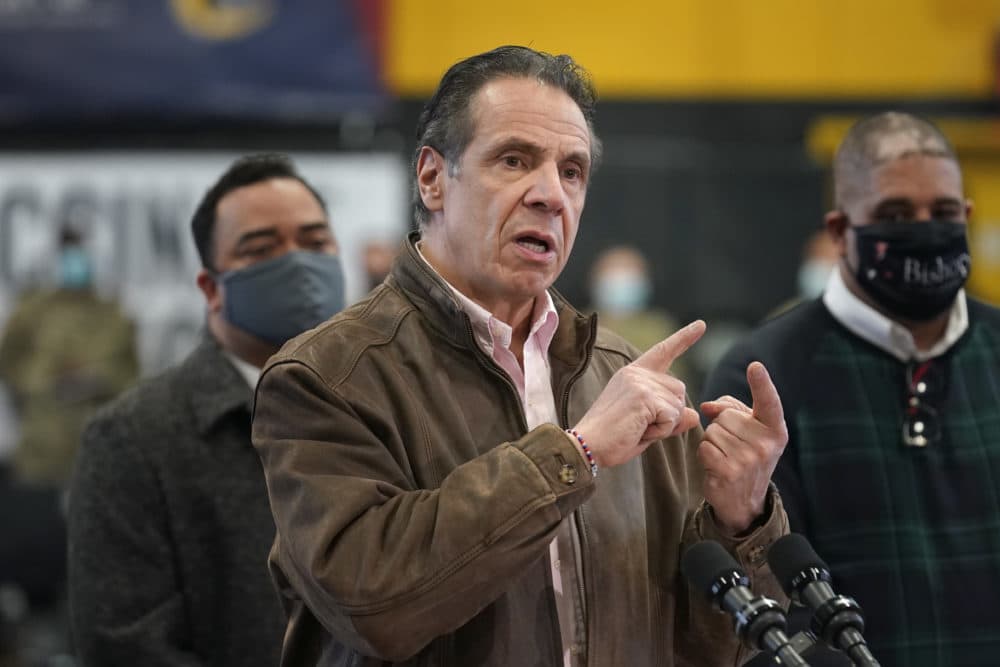Advertisement
Commentary
Andrew Cuomo's Expectation Of Impunity

New York Governor Andrew Cuomo, responding to allegations of sexual harassment, looks directly at the camera and says, “I never touched anyone inappropriately.” Cuomo is not sorry for what he did or said. He’s angry about the audacity of women to refuse his advances and to demand consequences for sexual harassment.
Cuomo’s non-apology represents the expectation of impunity for sexual harassment the #MeToo movement has shone a light on. From Harvey Weinstein to Dominique Strauss-Kahn and now Andrew Cuomo, men who sexually harass women count on getting away with it. They ensure silence through threats of retaliation. They assume shame will stick to women rather than abusers. When women do speak out, abusers rewrite the narrative by denying the allegations altogether or claiming it was a simple misunderstanding.
The #MeToo movement, now nearly four years old, has succeeded in creating an opening for women to bring forward allegations with a new expectation of being heard, rather than shamed or ignored. Three women have spoken to journalists about Cuomo and their accounts have been corroborated. Perhaps more women will come forward.

Although there is no "Hollywood Access" tape like the one where Trump was caught bragging about sexual assault, there is that photograph. Captured by her friend at a wedding in 2019, the photo shows Cuomo with a death grip on Anna Ruch’s face after he has said, “Can I kiss you?” This isn’t a question; it is a declaration of intent. Cuomo is big, imposing. He is literally smacking his lips. Ruch, now 33, is the third woman so far to come forward with an account of sexually inappropriate behavior by Cuomo. Two women who are former state employees have accused Cuomo of sexual harassment. But it is Ruch we have the photograph of, the one in which he is touching her inappropriately.
When the photo was taken, #MeToo had already propelled a long-overdue conversation about sexual violence for two years. And, yet, Cuomo responded just like Harvey Weinstein did when confronted with overwhelming evidence of a pattern of misconduct. Like Weinstein, he initially denied it, then offered a non-apology of “sorry, if anyone misunderstood,” and finally said the culture had changed around him, but he was fine. Echoing Harvey Weinstein by refusing to take responsibility in 2021 is a bad look for the governor.
Impunity makes a claim on someone without acknowledging a debt. Rather than being based on reciprocity, that demand chips away at women’s bodily autonomy. Sexual harassment begins with the premise that women owe men something: a smile, a hand on our lower backs, a kiss. It takes over our jobs, our peace of mind and a feeling of safety in our own skin. But #MeToo has rightly, and at long last, raised an expectation of accountability where impunity previously existed.
The photograph captures a startling display of impunity in real time. Cuomo’s hands are blurred because they are in motion. His arm is bent at the elbow and he is tightening his grip. Ruch might be raising her arms to maintain distance, to protect herself. The photo captures the second time Cuomo has touched her inappropriately. He has already, according to Ruch, put his hand on her lower back, which she pointedly removed. As if rising to this challenge to his power over her, he grabs her face, announces his intent, and then kisses her. I count three inappropriate touches.
Two former aides have made separate allegations. Lindsey Boylan was the first, alleging multiple instances of unwanted touching and sexual comments. Charlotte Bennett, 25, a former aide, also accused Cuomo of sexual harassment. Once, when she was alone with him in his State Capitol office — that is, at work — he asked if she thought age made a difference in romantic relationships and whether she was monogamous. Bennett said the interaction made her scared and upset: “I understood that the governor wanted to sleep with me. And I was wondering how I was going to get out of it.”
#MeToo has rightly and at long last raised an expectation of accountability where impunity previously existed.
There is now a clear pattern of Cuomo using the power of his position and office to sexually harass young women. Anna Ruch did not work for the state, but as a former member of the Obama administration and the 2020 Biden campaign, she is definitely part of the professional milieu of Democratic politics.
Cuomo’s behavior disturbed the women. Ruch said, “It’s the act of impunity that strikes me. I didn’t have a choice in that matter. I didn’t have a choice in his physical dominance over me at that moment. And that’s what infuriates me. And even with what I could do, removing his hand from my lower back, even doing that was not clear enough.”
That he characterizes his actions as “mentoring” makes it clear that women at the beginning of their careers will be subjected to unwanted sexual contact and not professional development.
What should happen now? The #MeToo movement offers clarity. Appropriately, the state attorney general's office is conducting an independent investigation. Cuomo’s statements have been “evolving,” but the gap between what he did — sexual harassment — and what he wants to call it — banter, a little fun, mentoring — is widening.
At this point, Cuomo’s pattern of sexualizing the workplace through unwanted touching and sexual remarks is clear. Coupled with his characterization of targeting young women who are particularly vulnerable to professional retaliation as “mentoring,” makes Cuomo unfit for an executive role. The #MeToo movement, again, shows a way forward. Calls for his resignation did not happen instantly. There was no rush to judgment. Instead, that call is building now as more people read the accounts of the women whom Cuomo allegedly harassed and compare his excuses to the evidence.
Many commentators have been trying to characterize the #MeToo movement as a problem for Democrats, but I think we are witnessing, instead, the power of #MeToo to shift a broad cultural understanding of impunity. Listening to survivors has ushered in a new era of accountability. Depending on the outcome of the investigation, Cuomo may well learn that it wasn’t “sensitivities” that changed, but our tolerance for impunity.
